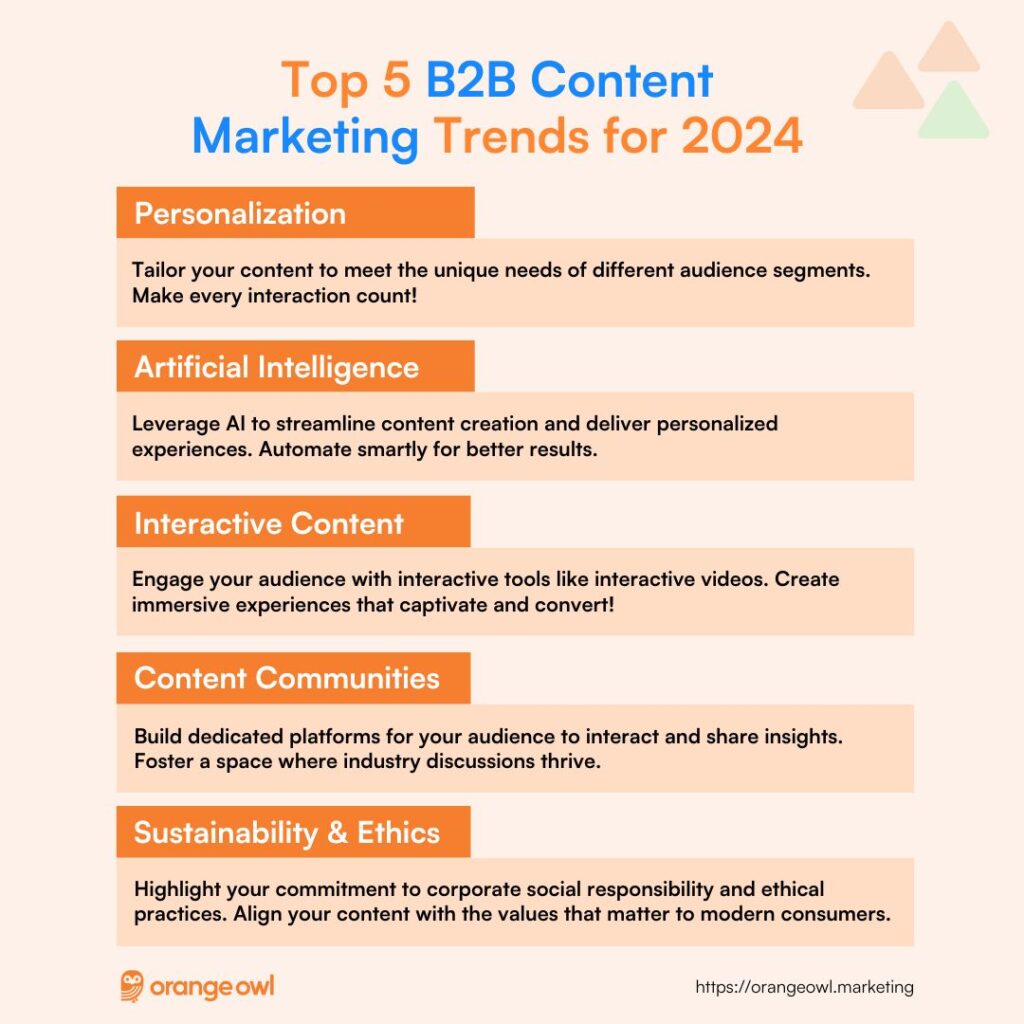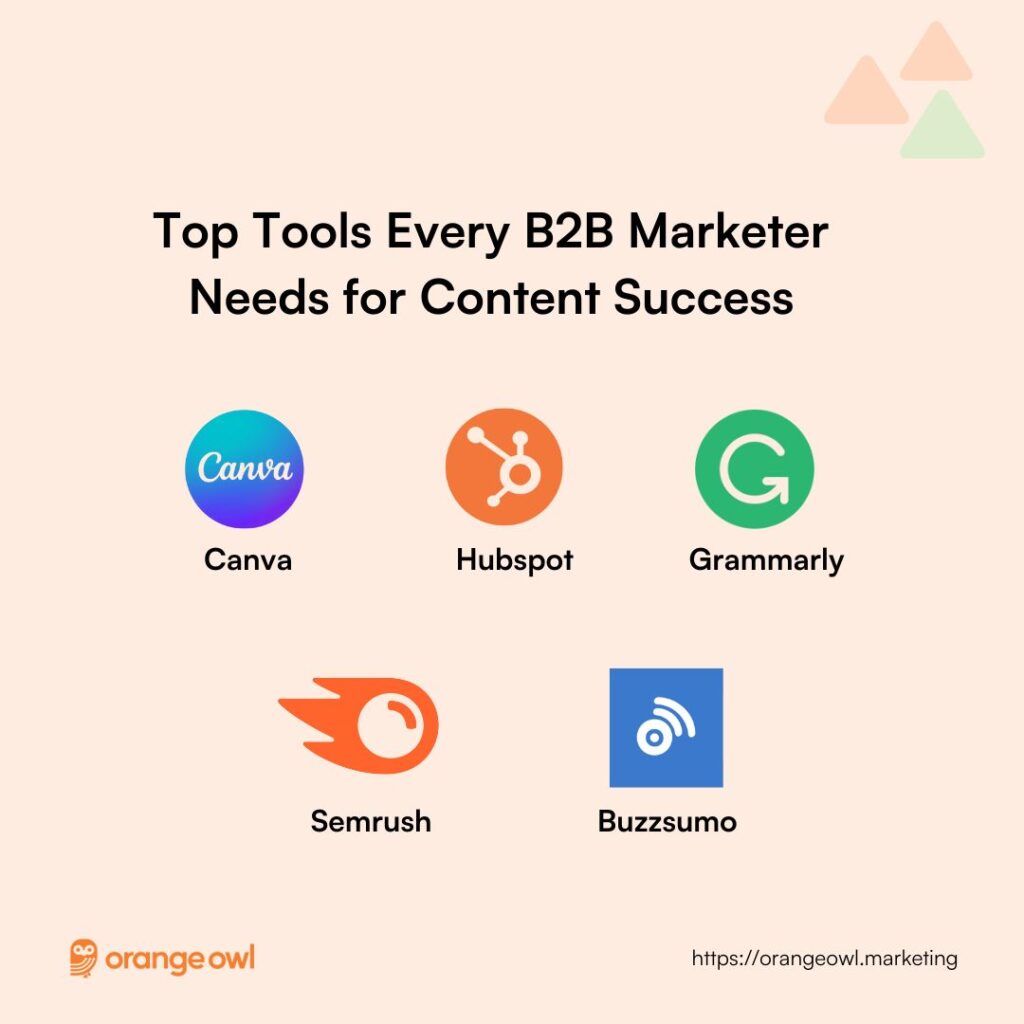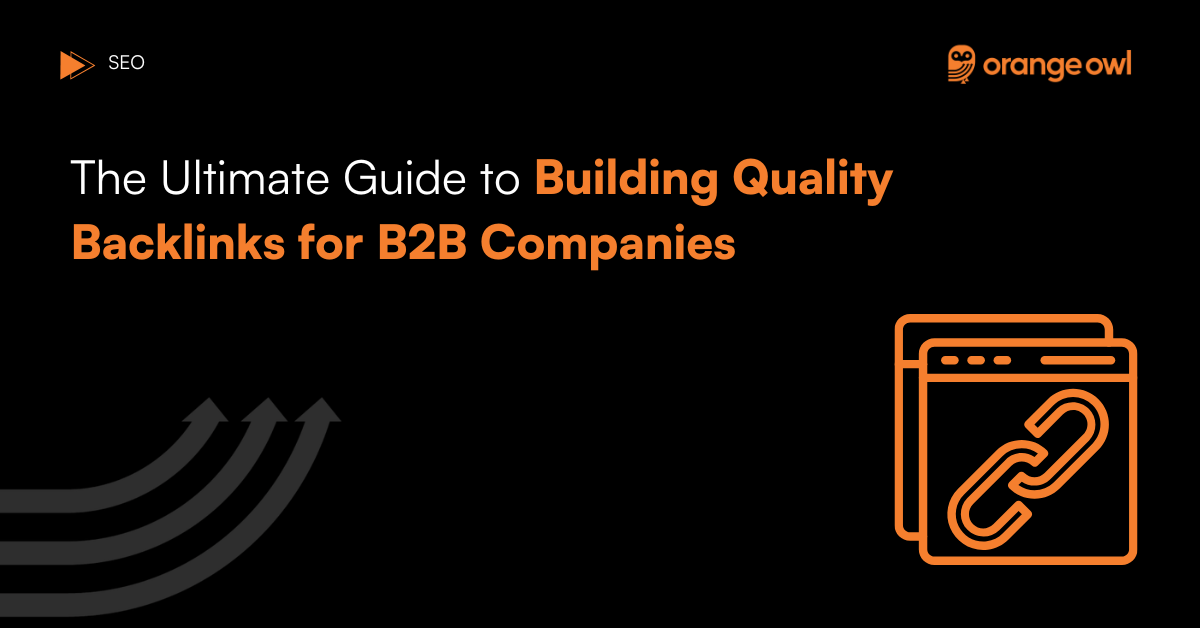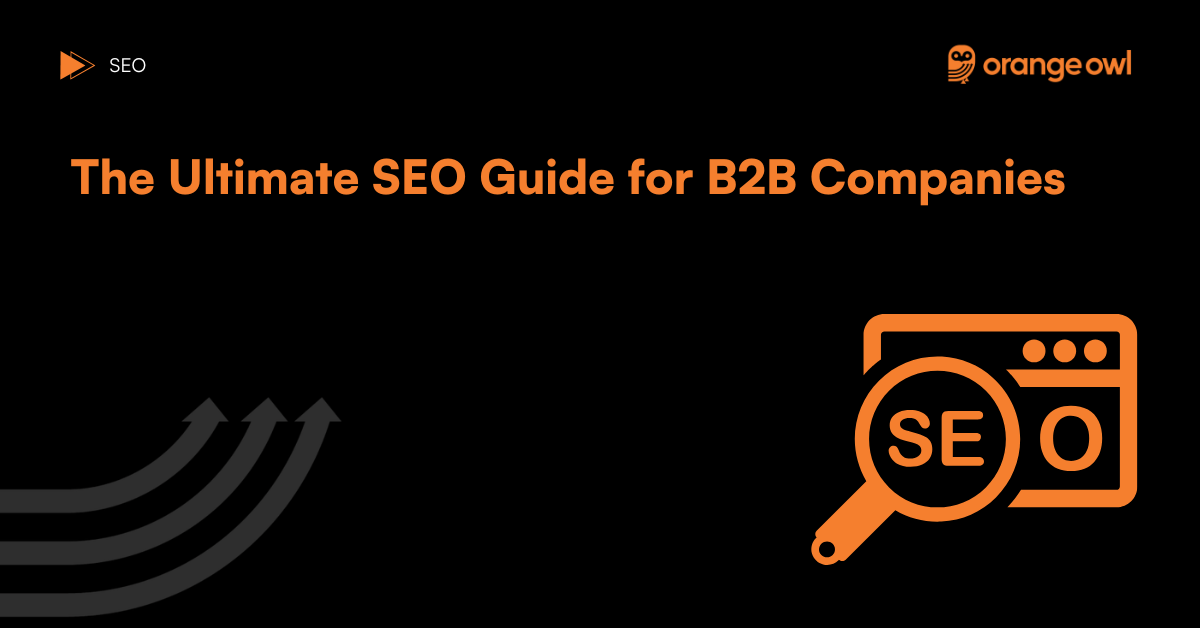The Ultimate Guide to B2B Content Marketing for Success in 2025
Vivek Goel
February 4, 2025

Table of Contents
Introduction
In today’s rapidly evolving digital landscape, B2B content marketing has emerged as a cornerstone GTM strategy for businesses aiming to enhance engagement, generate leads, and drive sales. This comprehensive guide delves into the essence of content marketing within the B2B context, underscoring its importance, benefits, and actionable strategies tailored for 2025.
What is B2B Content Marketing?
Content marketing is a strategic approach focused on creating and distributing valuable, relevant, and consistent content to attract and retain a clearly defined audience — and, ultimately, to drive profitable customer action. For B2B companies, this means crafting content that appeals to the interests and challenges of the businesses one aims to serve.

Why is B2B Content Marketing Important?
Content marketing stands at the forefront of digital marketing strategies for several reasons:
- Building Brand Authority: Regularly publishing insightful content establishes your business as a thought leader in your industry.
- Enhancing Engagement: Quality content engages potential clients, keeping them interested and connected to your brand.
- Supporting Sales Processes: Educational and informative content can nurture leads throughout the sales funnel, easing the buying decisions.
Top Benefits of B2B Content Marketing
Content marketing in the B2B sector serves as a powerful tool, aligning closely with the informational needs and decision-making processes of professional audiences. Unlike B2C marketing, which often leverages emotion-driven content to prompt quick purchasing decisions, B2B content marketing focuses on delivering value through educational and solution-based content. Here are the top benefits of content marketing in the B2B realm, each reinforcing the importance of a strategic approach:
1. Lead Generation
One of the primary advantages of content marketing in B2B industries is its ability to generate leads. By creating high-quality, relevant content, businesses can attract potential clients to their websites. For instance, a software solutions company can publish case studies or how-to guides that address specific industry problems. When potential clients search for solutions to these problems and find helpful content on your site, they are more likely to consider your services, allowing you to capture leads at various stages of the buying process.
2. Increased Visibility and Reach
Content marketing significantly enhances a company’s visibility and reach. SEO-optimized content, in particular, plays a crucial role in this by improving search engine rankings and putting your business in front of potential clients who are actively searching for related topics. This is especially important in the B2B sector, where the buying cycle can be lengthy and complex, involving multiple stakeholders. Effective content that ranks well for specific keywords helps ensure that these stakeholders find your business during their research phases.
3. Customer Education
In B2B transactions, where products or services can often be complex and require significant investment, educating potential customers is crucial. Content marketing allows companies to explain the features, benefits, and applications of their offerings in detail. For example, a company that manufactures industrial equipment can use blog posts and videos to explain how their machines work and how they can be integrated into different production lines. Educating customers not only helps them understand your products but also positions your brand as a knowledgeable and trustworthy provider.
4. Brand Loyalty
Consistent, valuable content fosters trust and loyalty among a brand’s existing customer base. In the B2B context, where repeat business and long-term relationships are common, this is particularly valuable. Regularly updating customers with industry news, advancements in your products, and insightful analysis can keep your brand top of mind. Moreover, engaging content that helps customers solve real business problems or improve their operations can strengthen emotional and professional ties to your brand.
5. Thought Leadership
By regularly publishing insightful, authoritative content, B2B companies can establish themselves as thought leaders in their industry. This not only enhances brand prestige but also influences purchase decisions. Decision-makers are more likely to engage with companies they perceive as experts in their field. For example, a B2B financial services firm that produces in-depth analyses of market trends and regulatory changes positions itself as an expert in the financial sector, making it more attractive to potential clients looking for reliable and informed partners.
These benefits underscore the strategic importance of content marketing in the B2B sector. By effectively leveraging different types of content, companies can not only attract and convert leads but also build a reputable brand that is seen as both a leader and a reliable resource in its industry.
B2B Content Marketing Statistics for 2025
Top 10 compelling statistics that underscore the effectiveness and transformational potential of content marketing for B2B companies:
- 70% of B2B marketers reported that they are producing more content this year compared to the previous year.
- Content marketing generates 3 times as many leads as traditional outbound marketing but costs 62% less.
- 95% of B2B customers consider content as trustworthy when evaluating a company and its offerings.
- 78% of B2B companies use content marketing to achieve brand awareness goals.
- Video content has been shown to improve conversion rates by over 80% in B2B marketing strategies.
- SEO-driven content brings in 7.5x more traffic than non-SEO content.
- 55% of B2B marketers say they use automated tools for content marketing to enhance efficiency.
- Interactive content, such as quizzes and polls, is gaining traction and is used to engage customers more deeply.
- 40% of B2B marketers have a documented content marketing strategy.
- Businesses that blog get 67% more leads than those that don’t.
Check out the list of 100+ Content Marketing Stats and Trends.
Types of B2B Content Marketing
In the B2B sector, content marketing takes on various forms, each serving unique purposes and catering to different segments of the buyer’s journey. Understanding these types can help tailor strategies that engage your target audience effectively. Here are some of the key types of content used in B2B marketing, with examples and their strategic benefits:

B2B Content Marketing type 1. Blogs and Articles
Blogs and articles are staples in B2B content marketing due to their versatility in addressing numerous topics, from industry trends and how-to guides to deep dives into technical issues. They are crucial for SEO, helping businesses rank higher in search engine results through keyword optimization and backlinking.
For instance, a B2B company specializing in cloud computing might publish articles about best practices for data security in the cloud, serving both as thought leadership and as a way to attract organic search traffic.

B2B Content Marketing type 2. Videos
Videos are highly engaging and can significantly enhance online presence by providing a dynamic way to demonstrate products or services, explain complex solutions, and share customer testimonials.
For example, a B2B manufacturing company could use video tours to showcase its production processes or detailed product demos to explain the features of a new piece of machinery, thereby helping potential customers visualize their offerings and enhancing trust.
B2B Content Marketing type 3. Infographics
Infographics are powerful tools for presenting data, statistics, workflows, or timelines visually engagingly, making complex information easier to digest. They are particularly effective in B2B contexts where data-driven decision-making is prevalent.
A financial services firm could create infographics that detail market trends or investment strategies, providing valuable insights that can be quickly understood at a glance.
B2B Content Marketing type 4. Case Studies and Whitepapers
Case studies are in-depth accounts of how a company has successfully resolved client issues or how a product has been implemented effectively, highlighting the company’s expertise and the tangible benefits of its solutions. Whitepapers, on the other hand, are often more detailed and research-focused, ideal for demonstrating thought leadership and in-depth knowledge of specific industry challenges.
For instance, a marketing agency might develop a case study highlighting its successful campaign for a real estate company aimed at boosting lead generation and enhancing social media presence. This case study would demonstrate how the agency crafted targeted advertising strategies and engaging social media content that not only attracted prospective tenants but also fostered community among existing residents, thereby enhancing both immediate inquiries and long-term tenant retention.
B2B Content Marketing type 5. Podcasts
Podcasts are becoming increasingly popular in B2B content marketing as they allow companies to reach their audience during their downtime, such as commuting or exercising. They can be used to discuss industry news, interview thought leaders, or explore complex industry challenges in a format that’s easy to consume.
A technology B2B company, for example, could host a podcast featuring interviews with CTOs from various industries discussing future tech trends, providing valuable insights while subtly promoting their expertise.
B2B Content Marketing type 6. Social Media Content
In B2B content marketing, social media content must be strategic and tailored to professional audiences. LinkedIn posts, Twitter threads, and Facebook groups can be used to share company news and industry insights and engage directly with customers.
For example, a B2B software company might use LinkedIn to post industry analysis, share user-generated content, and participate in discussions that establish its authority in the tech space.
B2B Content Marketing type 7. E-Books
E-books offer a comprehensive deep dive into subjects too broad or complex for shorter pieces. They can serve as lead magnets, capturing contact information in exchange for valuable resources.
For example, a marketing agency could provide an e-book on “Advanced SEO Strategies for B2B Marketers,” offering it as a free download on their website to attract and capture leads.
B2B Content Marketing type 8. Email Newsletters
Email newsletters keep your audience updated and engaged, with regular content directly delivered to their inbox. They can highlight recent blog posts, case studies, upcoming events, or new products.
For example, a B2B healthcare company might send monthly newsletters featuring the latest research in the industry, updates on new regulations, and insights from healthcare professionals.
By leveraging these diverse types of content, B2B marketers can build a robust strategy that not only informs and educates but also engages and converts their target audience effectively.
Developing Your Content Marketing Strategy – Steps for Effective B2B Content Marketing
Before diving into the specific steps of crafting a successful B2B content marketing strategy, it’s essential to understand the foundational premise of content marketing in the B2B realm. In the business-to-business sector, content marketing isn’t just about spreading brand awareness; it’s a strategic approach aimed at engaging a defined audience of professionals and decision-makers.
By providing them with valuable, relevant content, businesses can build credibility, foster trust, and establish thought leadership, which are critical for nurturing long-term relationships and driving profitable customer action.
With this context in mind, let’s explore the systematic approach to developing a content marketing strategy that resonates deeply with a professional audience and aligns seamlessly with overarching business goals. Here are the detailed steps:
1. Setting Goals and Objectives
In B2B settings, it’s crucial to establish goals that are not only clear and measurable but also closely aligned with the broader business objectives. For instance, if a software company aims to increase its market share, content marketing goals might focus on generating qualified leads through white papers and webinars that demonstrate the software’s value to business operations.

2. Understanding Your Audience
Conducting thorough market research is essential to grasp the specific needs, preferences, and behaviour patterns of your target audience. A B2B technology firm, for example, might find that its target decision-makers are most concerned with data security and efficiency. Hence, their content should address these issues directly, perhaps through case studies or data-driven blog posts that speak to these pain points.
3. Content Auditing
Evaluating your existing content can uncover what resonates with your audience and what doesn’t. For a B2B consultancy firm, a content audit might reveal that their most read articles are those that deal with industry regulations. This insight would guide them to produce more regulatory-focused content to engage their professional audience further.
4. Choosing the Right Channels
Selecting the right channels is about understanding where your audience is most active and receptive. For B2B marketers, LinkedIn might be a priority channel for sharing thought leadership articles, whereas YouTube could be ideal for how-to videos explaining complex products or services.
5. Content Creation:
Developing a content calendar is crucial to maintain a consistent publishing schedule. For a B2B manufacturing company, this might involve monthly technical blogs, quarterly industry reports, and regular updates on product developments, ensuring content is timely, relevant, and high-quality.
6. SEO
Implementing effective SEO strategies, including on-page elements like meta descriptions and keywords and off-page tactics like link-building from reputable sites, can significantly enhance visibility. A B2B financial services firm might focus on keywords related to “business finance management” or “corporate tax savings” to attract specific searches from business clients.
7. Content Optimization and Performance
Testing different content formats and continually measuring performance helps refine strategies. A B2B healthcare solutions provider could use A/B testing to determine whether their audience prefers webinars or detailed guides on healthcare compliance.
8. Content Distribution and Promotion
Using channels like email marketing to distribute newsletters and LinkedIn to share articles helps extend the reach of your content. Engaging in partnerships with industry influencers can also amplify your visibility, as seen when a B2B software provider collaborates with a well-known tech influencer to review their product.
9. ROI Measurement
It’s essential to track the effectiveness of your content marketing efforts by analyzing key performance indicators (KPIs) and using analytics tools. This could involve monitoring lead generation rates, website traffic, engagement metrics, and conversion rates to evaluate the success of a B2B marketing campaign and its impact on the bottom line.
By following these steps and tailoring content strategies to the unique needs and behaviours of B2B audiences, companies can cultivate meaningful engagement and drive substantial business results.
Common Pitfalls and Solutions in B2B Content Marketing
Content marketing is a critical strategy for B2B companies aiming to establish thought leadership, generate leads, and nurture customer relationships. However, certain pitfalls can hinder the effectiveness of content marketing efforts. Here, we explore common challenges and provide solutions, complete with B2B examples, to help you navigate these issues effectively.
1. Content Saturation
In the digital age, virtually every company has a blog or some form of digital presence, which can lead to an overwhelming amount of content available online. This “content saturation” makes it difficult for companies to stand out.
Solution: Focus on niche topics or unique angles that are less crowded but highly relevant to your specific audience. For example, a B2B cybersecurity firm might find broad topics like “data security” highly competitive. Instead, they could focus on “cybersecurity for IoT in healthcare,” which is a niche but critical area that could attract a specific segment of the healthcare industry looking for specialized knowledge.
2. Evolving Consumer Behaviors
B2B buyer behaviours are constantly evolving, influenced by technological advancements and changing industry standards. What worked a year ago might not be effective today.
Solution: Stay flexible and adapt your content marketing strategy based on ongoing analytics and customer feedback. Use tools like Google Analytics to monitor which types of content are performing well and which aren’t. A B2B software provider, for instance, might notice that their audience prefers short, interactive webinars over lengthy whitepapers. They could then adjust their content strategy to focus more on producing these preferred formats.
3. Legal Considerations
B2B Content marketing is not just about creativity and strategy; it’s also about navigating the legal landscape. This includes copyright laws, data protection regulations, and industry-specific compliance issues.
Solution: Ensure all content is compliant with relevant laws and regulations to avoid legal pitfalls. This involves not only securing copyrights for images, videos, and other media but also adhering to regulations such as GDPR for data protection. For instance, a B2B marketing agency creating content for clients in Europe must ensure that all its content strategies are GDPR compliant, particularly when collecting data through content-driven lead generation activities.
4. Overlooking Content Distribution
Creating high-quality content is crucial, but it’s only effective if it reaches the right audience. B2B companies sometimes focus too much on content creation and not enough on distribution strategies.
Solution: Develop a robust content distribution plan that leverages multiple channels. For instance, a B2B manufacturing company can benefit from not only posting articles on their blog but also sharing them on LinkedIn, where many industry professionals engage. Additionally, consider email newsletters to ensure your content directly reaches those who can benefit from it, enhancing visibility and engagement.
5. Inconsistent Content Quality
In the rush to keep up with content demands, B2B companies may sacrifice quality for quantity. This can hurt the brand’s reputation and reduce the effectiveness of content marketing efforts.
Solution: Implement a quality control process where each piece of content is reviewed for accuracy, relevance, and engagement before publication. For example, a B2B financial services firm could establish a review panel consisting of subject matter experts and content strategists who ensure that all content meets industry standards and is technically accurate before it goes live.
6. Failing to Align Content with Buyer’s Journey
Content that does not align with the stages of the buyer’s journey can fail to convert prospects into customers. Many B2B marketers produce content without considering whether it addresses the needs of prospects at different stages.
Solution: Map out the buyer’s journey for your specific audience and create content tailored to each stage. For instance, a B2B tech startup might create awareness-stage content that addresses common industry problems, consideration-stage content that presents case studies, and decision-stage content that details product comparisons and user testimonials.
7. Ignoring SEO and Keywords

SEO is often seen as less critical in B2B than in B2C, but this misconception can lead to missed opportunities in driving organic traffic and generating leads.
Solution: Integrate SEO best practices into your content creation process. Use keyword research tools to identify industry-specific keywords and incorporate them into your content. A B2B logistics company, for example, should optimize its content for specific keywords like “supply chain management solutions” or “freight forwarding software,” which are likely to be searched by their target customers.
Check out the list of Top 20 B2B Content Marketing Mistakes
By addressing these common pitfalls with strategic solutions, B2B companies can enhance their content marketing efforts, ensuring they produce not only valuable content but also effectively reach and engage their intended audience. This approach leads to better lead generation, customer retention, and overall brand strength in competitive markets.
Top 5 Trends in B2B Content Marketing for 2025

- Personalization: Creating tailored content to meet the specific needs of different segments within your audience.
- Artificial Intelligence: Using AI to automate content creation and personalize user experiences.
- Interactive Content: More businesses will leverage interactive tools like augmented reality and interactive videos to engage users more deeply.
- Content Communities: Building dedicated platforms or forums where users can interact, share insights, and discuss industry-related topics.
- Sustainability and Ethics: Emphasizing content that addresses corporate social responsibility, sustainability practices, and ethical business practices, aligning with the values of modern consumers.
Top Tools for B2B Content Marketing

To effectively manage and optimize your content marketing efforts, consider integrating these top tools:
- HubSpot: Offers a comprehensive suite of marketing tools, including content management, SEO, and analytics.
- Semrush: Provides extensive SEO toolkit, including keyword research, content audit, and competitive analysis features.
- Canva: Ideal for creating visually appealing graphics and presentations for content marketing.
- Hootsuite: Streamlines social media management for scheduling posts, monitoring engagement, and analyzing social media traffic.
- Google Analytics: Essential for tracking website performance, understanding audience behaviour, and measuring content engagement.
Top B2B Content Marketing Myths
Many misconceptions can derail a B2B content marketing strategy. Contrary to popular belief, content marketing is not just about blogging; it involves various formats like videos, podcasts, and infographics. It’s a long-term game requiring quality over quantity, and it’s beneficial for businesses of all sizes. Remember, AI tools can assist but not replace human creativity, and a well-defined strategy is crucial for success.
Wrap-Up and Key Takeaways
B2B content marketing is more crucial than ever, offering myriad benefits, from enhanced engagement to increased conversions. By understanding your audience, creating valuable content, and leveraging the right tools, you can develop a robust content marketing strategy that drives business growth.
Remember, the key to successful content marketing lies in consistency, relevance, and alignment with broader business objectives. Keep abreast of the latest trends and continuously refine your approach based on performance data to stay competitive in the evolving digital marketplace.
By integrating these strategies, tools, and insights into your content marketing plan, you’re well on your way to elevating your B2B marketing efforts and achieving substantial results in 2025 and beyond.
Frequently Asked Questions (FAQs) on B2B Content Marketing
Content marketing is a strategic approach focused on creating and distributing valuable, relevant, and consistent content to attract and engage a target audience, with the ultimate goal of driving profitable customer action.
Content marketing builds relationships with potential and current customers, establishes your brand as a thought leader, and improves brand awareness. It’s essential for driving engagement and nurturing leads through the sales funnel.
Begin by identifying your target audience, understanding their needs and content preferences. Set clear goals, develop a content strategy that includes various content types (like blogs, videos, and social posts), and decide on distribution channels. Finally, create a content calendar to organize and schedule content production and publication.
The best platforms for content marketing depend on your audience. Commonly used platforms include blogs, YouTube, LinkedIn, Facebook, and Instagram. Choose platforms where your target audience is most active and engaged.
Measure success using key performance indicators (KPIs) such as website traffic, lead generation, social media engagement, and conversion rates. Tools like Google Analytics and social media analytics can help track these metrics.
Traditional marketing often involves direct sales pitches and advertisements. In contrast, content marketing focuses on creating informational or entertaining content that doesn’t explicitly sell but helps build brand recognition and trust, leading to sales over time.
The frequency of publishing depends on your resources and audience engagement levels. For blogs, a good practice is once a week. Social media posts might be daily or several times a week based on the platform and engagement strategy.
The effectiveness of content types varies by audience and industry. Generally, blogs, videos, infographics, and case studies are highly effective for providing value and engaging different segments of your audience.
To create standout content, focus on originality, provide real value, and address specific audience needs or pain points. Use engaging headlines, quality visuals, and interactive elements. Staying updated with industry trends and frequently analyzing audience feedback can also guide content innovation.
Absolutely! High-quality, relevant content can significantly improve your SEO by increasing site visibility in search engine results, driving organic traffic, and generating backlinks. Ensure your content is optimized with strategic keywords, meta descriptions, and strong headlines.



